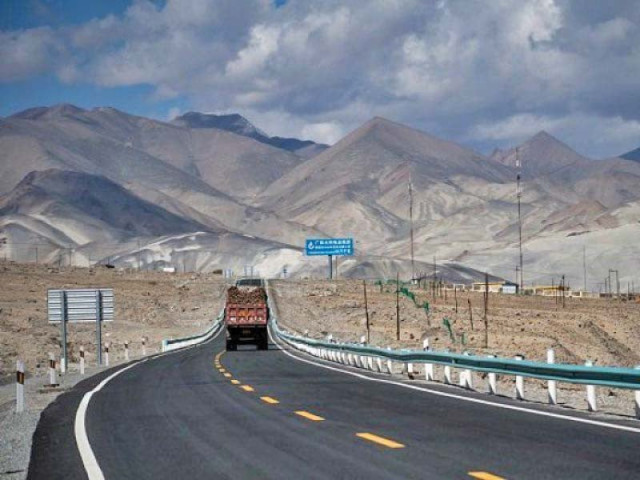CPEC jewel hasn’t shined yet
Even after 10 years of the CPEC, the port is not connected with the national electricity grid

The jewel of the China-Pakistan Economic Corridor –the Gwadar Port and Free Economic Zone – could not shine because of Pakistan’s breach of commitments to timely provide essential utilities, land and connect the sea port with the rest of the country, reveals an internal official assessment.
Even after 10 years of the CPEC, the port is not connected with the national electricity grid, the land promised to be given for the development of the Gwadar Free Economic Zone is not provided and there is no road or rail links with rest of Pakistan, according to October’s assessment of the CPEC Secretariat.
Pakistan’s commitments under the $7 billion International Monetary Fund programme also run contrary to some of the commitments made under the CPEC. The coalition government has committed with the IMF that it will end all the incentives given to the special economic and export processing zones by 2035.
The sources said these issues were agitated recently during a meeting chaired by the Planning Minister Ahsan Iqbal. He issued instructions for the resolution of these issues –like dozens of similar instructions given in the past by Minister Iqbal and his predecessors.
The sources said that China raised all the outstanding issues during the 13th Joint Cooperation Committee (JCC) meeting that was held in May this year but the situation remains unchanged. The JCC is the strategic thinking and implementation arm of the CPEC.
Pakistan had handed over the management and operations of the Gwadar Port to China Overseas Port Holding Company Private Limited (COPHC) for a period of 40 years. Pakistan describes the port as the “jewel of the CPEC” and the “gateway” to the rest of the world. However, it has not done enough to fulfill its sovereign commitments.
During the first visit of any Chinese Prime Minister in 11 years, no major new agreement under the CPEC had been signed, barring a currency exchange related agreement.
The Gwadar Port Authority had committed to deliver Free Zone land to COPHC. However, the Pakistan Navy and Pak Coast Guard still occupy the land in the north Free Zone, according to these documents. Numerous meetings have been held in the past to resolve this issue.
Pakistan had also promised to provide complete tax exemptions but the COPHC is still subject to various provincial taxes, cess, stamp and other duties on the import of raw materials.
The major obstacle is the lack of road and rail connectivity. It was the responsibility of Pakistan to complete the M-8 road link and other roads. However, only one major portion is completed and the rest of the critical links are still under construction.
As the current situation stands, the M-8 and other roads are still under construction. Also, Gwadar Port and Free Zone have no external rail connections, according to the CPEC Secretariat.
According to the minutes of the 13th JCC meeting, China had also taken up the issue of non-completion of the remaining sections of M-8, Hoshab-Awaran and Awaran-Naal, road for full connectivity of Gwadar Port through local resources.
The Pakistani side informed the JCC that the Nokundi-Mashkel section of the Project was under construction while Mashkel-Panjgur was in the planning and project preparation stages and execution will commence after completing the procedural requirements. The minutes showed that the Pakistani side proposed that the Mashkel-Panjgur section of the project may be undertaken by the Chinese enterprise for consideration under CPEC financing.
Likewise, the construction of breakwaters of Gwadar port had to be financed by Pakistan. However, despite considerable time, the breakwater has not been built leaving the port operation exposed to major safety hazards.
In the 13th JCC meeting, China had emphasized the importance of the Gwadar Port breakwater for safe berthing operations at the port and suggested the Pakistani side start the breakwater project as soon as possible.
China underscored the connection between the construction of the dredging project of Gwadar Port and the second phase expansion of the port, and suggested the Pakistani side carry out dredging construction of the existing waterway as soon as possible.
Pakistan had also promised to connect local utilities like water, electricity, gas and sewerage to the Port and Free Zone. The municipal pipe network for water supply and sewerage is still not connected to these two areas, and local water is far from meeting daily needs, according to the CPEC Secretariat.
The status report showed that Gwadar also lacks gas and transportation facilities and the electricity transmission lines connecting urban substations with Gwadar port and Free Zone have not been built.
During the 13th JCC meeting, the Pakistani side informed that water supply lines from the 1.2 MGD ROD plant have been connected to Gwadar Port and the New Gwadar International Airport. It further stated that two feeders have also been installed to provide electricity to the North Free Zone, while electrification of the South Free Zone is expected to be completed by June2025.
In May this year, China had emphasized the importance of freshwater supply for project operation, and suggested the Pakistani side promote the connection of power grids to Gwadar Port and the South Free Zone as soon as possible, ensuring that relevant supporting projects are in place.
Gwadar port is not fully utilized due to multiple reasons, although Pakistan has recently stated that Afghanistan has started using the port.
The CPEC Secretariat’s assessment was that the Ministry of Commerce requires Afghan Transit Trades to pay a bank guarantee for the amount of customs duties on their goods, which is not returned to unit customs clearance in Afghanistan. As a result, a large amount of cash flow of traders gets stuck and consequently, they prefer Iran’s Chabahar Port.
The JCC had appreciated the efforts made by Pakistan in routing public sector bulk cargo through Gwadar Port which had been very helpful in operationalization of Gwadar Port.
But until a key link road, Basima-Khuzdar road, in Balochistan is completed, the distance for Gwadar-bound traffic from Punjab and other northern parts of the country cannot be reduced.
During the 13th meeting, China underscored the importance of RMB internationalization in promoting trade settlement between the two sides, reducing foreign exchange conversion costs and risks. It is suggested to establish RMB internationalization pilot projects in the Gwadar Free Zone.
The Pakistani side further informed that the RMB internationalization matter has already been raised with the relevant authorities, recommending that the Gwadar Free Zone (GFZ) be facilitated in accordance with the legal framework governing Export Processing Zones and Special Economic Zones in Pakistan.



















COMMENTS
Comments are moderated and generally will be posted if they are on-topic and not abusive.
For more information, please see our Comments FAQ